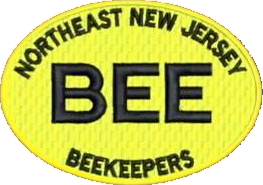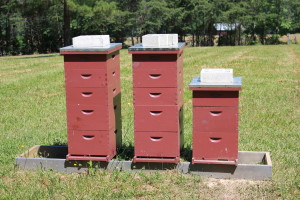New Jersey Department of Agriculture’s Best Management Practices for Beekeepers in Populated areas
There are approximately 3,000 to 3,500 registered beekeepers in New Jersey. Of these, only about 5 percent can be considered commercial beekeepers having 20 or more colonies of bees. The majority of the registered beekeepers in the state manage only 1 to 10 colonies. It is possible to keep honey bees in crowded suburban areas, on tiny city lots or on rooftops in large or small cities without problems. However, keeping bees successfully in a populated area requires a good understanding of basic bee biology, property rights and human psychology. Beekeepers in suburbs and cities need to manage their bees so the y do not become a nuisance to their neighbors. By understanding the circumstances under which bees will bother people, beekeepers can take measures to alter circumstances so their bees do not create a problem.
Honey bees can be kept almost anywhere there are flowering plants that produce nectar and pollen. Choose a site for beehives that is discrete , sheltered from winds and partially shaded. Avoid low spots in a yard where cold, damp air accumulates in winter. Be considerate of non- beekeeping neighbors. Place hives so that bee flight paths do not cross sidewalks, playgrounds or other public areas. Provide your bees with a water source in your yard to prevent them from seeking out water at neighbors’ swimming pools or water spigots.
1. Hive Registration. All honey bee colonies wintering in the State of Ne w Jersey shall have their location registered annually with the New Jersey Department of Agriculture by the beekeeper in accord with Regulations established by the Department of Agriculture.
2. Hive Type. In accordance with N.J.S.A.4: 6-10, all honey bee colonies shall be kept in hives with removable frames, which shall be kept in sound and usable condition. Hives must be capable of being inspected by the Department of Agriculture.
3. Colony Density No more than three colonies of honey bees shall be kept on any tract of one-quarter acre or less in area. For every two colonies permitted on a Tract there may be maintained upon the same Tract one nucleus colony in a hive structure not exceeding one standard 9 5/8 inch depth 10–frame hive body with no supers attached as required from time to time for swarm management. Each such nucleus colony shall be moved to another Tract or combined with another colony on the subject Tract within thirty days after the date made or acquired.
4. Colony Location When a colony is located less than 10 feet from a property line, the beekeeper must establish a flyway barrier. This should be at least 6 feet tall and extend 10 feet beyond the colony on either side. It can be solid, vegetative or any combination of the two that forces the bees to cross the property line at a height of 6 feet. All colonies must be located at least 25 feet from a public sidewalk, alley, street or roads.
5. Fence A substantial barrier / fence must be erected to pr event animals and children from coming in close contact with the hives.
6.Colony Stewardship
(a).Colony Inspection. All colonies shall be inspected by the beekeeper or his delegate no less than three times between March 1 and October 1 of each year.
(b). Water. Each beekeeper shall ensure that a convenient source (within 10 to 25 feet distant from the hive or hives) of water is available to the bees at any time during the year when temperatures are 50°F or warmer so that t he bees are not encouraged to congregate at other water sources which may result in human or domestic pet contact. This water should be in a sunny location and be in a container which makes it easy for the bees to drink.
(c). Queens. Queens shall be selected from stock bred for gentle ness and non- swarming characteristics. All colonies shall be maintained with queens that shall be replaced if a colony exhibits unusual defensive behavior without due provocation or exhibits an unusual disposition toward swarming. It shall be the duty of the beekeeper to promptly requeen the colony when these conditions persist.
(d). General Maintenance. Each beekeeper shall ensure that no bee comb or other materials that might encourage robbing by honey bee s or other stinging insects, are left upon the grounds of the apiary site in suburban and urban environments.

